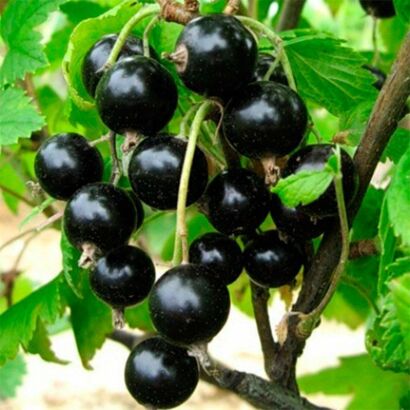Blackcurrant Necklace
View: black
Ripening period: mid-season
Fruits: 1.3-1.5 gr., sweet and sour
Yield: 3.7 q/ha
Regionation: Siberia.
Breeding: Altai
| Ripening period | Mid-season variety |
| fruit size | Traditional varieties |
| Productivity: | Medium |
| Selection | Russia |
| planting material | Currant |
The blackcurrant cultivar Necklace was bred by the breeder of the Altai Scientific Center for Agricultural Biotechnology L. Zabelina by crossing the varieties "Seedling Dove"; and "Complex cyst". In 2000, "Necklace" included in the State Register of the Russian Federation for the West Siberian region.
Variety advantages: high winter and drought resistance, immunity to powdery mildew.
Variety Features
The plant is vigorous. The bush is slightly sprawling with straight, hairless shoots. The kidneys are large, red. The leaves are 5-lobed, slightly wrinkled, dark green with purple veins. The flowers are large with cream or pinkish sepals. Fruit brush – medium size, for 6-8 berries.
Fruitsround shape, medium size, weight – 1.3 -1.5 grams. The skin of a ripe currant is black, shiny, thin. Pulp – juicy, with few light brown seeds. Taste – refreshing, sweet and sour. Tasting assessment – 4 points out of 5.
The purpose of the berries is technical – suitable for canning, making marshmallows, jams, compotes of homemade wine, tinctures, etc.
Yield "Necklaces" on average – 83.7 centners per hectare. Ripening dates for berries – medium (July), ripen together.
Immune to powdery mildew. Weakly affected by anthracnose, kidney mites.
Growing conditions. Winter- and drought-resistant currant variety «Necklace» grows well and bears fruit in the Siberian climate. It is especially popular with gardeners in the Novosibirsk, Tomsk, Kemerovo, Tyumen, Omsk regions, Altai Territory.
Selecting planting material
Before you buy Blackcurrant seedlings Necklace, pay attention to:
- The state of the root system. It should have 3-5 main healthy and elastic roots – at least 20 cm long, with many small fibrous processes. Without traces of dryness, putrefaction, diseases.
- Appearance of shoots – well-developed stems in the amount of 2-4 pieces, at least 40 cm long. Bark without signs of dryness, cuts, breaks, unnatural spots.
- Age of seedlings. Most of all, 2-year-old plants are suitable for planting. They adapt more easily and will grow in a new place.
Beware of crafts and "sick" planting material! Buy currant seedlings «Necklace» in nurseries and specialized stores.
Preparations
| Phase | Operation | Biopreparations | Comment |
|---|---|---|---|
| Pre-plant tillage | Disease treatment | SBT-Trichodermin TH82 | Fight against overwintering forms of pathogens 30-100 g/20 l of water per 1 weave |
| Pest control | SBT-Pecilomycin RM116 | wireworms. Soil pest control: larvae and adults of the May beetle, wireworm, mole cricket, etc. 100-150 g / 1 weave is applied by spreading |
|
| top dressing | Organic fertilizer "TOR" | Main application in April Proportion 1:20 |
|
| SBT-Ekosoil | Stimulation of biological activity 50 g per 20 l of water / 1 weave |
||
| root formation | Disease treatment | SBT-Trichodermin TH82 | Prevention of the development of a wide range of fungal diseases. Soaking the roots of seedlings 60 g/10 l for 50 pcs |
| SBT-Fitolek BS26 | Soaking the roots of seedlings Prevention of the development of a wide range of fungal diseases 60 g/10 l for 50 pcs. seedlings |
||
| top dressing | SBT-Biocomplex Amino | Root soaking of seedlings 30 ml/10 l for 50 pcs |
|
| vegetation | Disease treatment | SBT-Trichodermin TH82 | Prevention of the development of root rot Treatment in the phase of bud break 60-80 g per 1 weave, with a total water consumption of 30 - 50 l / per 1 weave |
| SBT-Fitolek BS26 | Prevention of powdery mildew, alternariosis, anthracnose, phomopsis, gray mold, curliness, septoria, tubercularia 40 g/10 l per 100 m2 |
||
| Pest control | SBT-Entolek | Aphid. Pest control mites, weevil, aphids, flower beetles, moths, moths, leafworms. Treatment during bud break 60–80 ml/10 l of water per 100 m2 |
|
| top dressing | SBT-Ekosoil | Stimulation of the development of the root system. improved provision of plants with nutrients 80–100 g per 1 hectare With a total water consumption of 30–50 l/1 hectare |
|
| Bloom | Disease treatment | SBT-Fitolek BS26 | Processing in the budding phase Prevention of powdery mildew, alternariosis, anthracnose, fomopsis, gray mold, curliness, septoria, tuberculariasis 40 g / 10 l per 1 weave |
| SBT-Trichodermin TH82 | Prevention of late blight, powdery mildew, root rot, gray mold, leaf spot 40 g/10 l per 100 m2 |
||
| top dressing | SBT-Biocomplex Amino | Stimulation of plant growth. Improvement of photosynthetic activity 20–30 ml/10 l per 1 hectare |
|
| Fruiting | Disease treatment | SBT-Fitolek BS26 | Prevention of powdery mildew, alternariosis, anthracnose, phomopsis, gray mold, curliness, septoria, tubercularia During the period of fruit formation (2-3 treatments) at intervals of 10-15 days 5 days before the start of harvesting 40 g / 10 l per 1 hundred square meters |
| SBT-Trichodermin TH82 | During the period of berry formation (2-3 treatments) at intervals of 10-15 days 60 g/10 l per 1 weave |
||
| Pest control | SBT-Entolek | Ticks. Pest control mites, weevil, aphids, flower beetles, moths, moths, leafworms. Treatment of plants during the formation of berries (2-3 treatments) at intervals of 10-15 days 80–100 ml / 10 l of water per 1 weaving |
|
| top dressing | SBT-Biocomplex Amino | During the period of berry formation (2-3 treatments) at intervals of 10-15 days 20–30 ml/10 l per 1 hectare |
|
| After harvest | Disease treatment | SBT-Trichodermin TH82 | Autumn processing Reducing the stock of overwintering forms of pathogens spraying 120 g per 10–15 liters per 1 weave |

